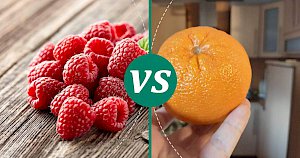Orange vs Raspberry: Calories & Nutrition Showdown


Orange vs Raspberry
Nutrition Facts
Serving size:
change
5g10g15g20g30g40g50g60g80g100g120g140g160g180g200g220g250g300g350g400g450g500g600g700g800g900g1000g
1oz2oz3oz4oz5oz6oz7oz8oz10oz12oz15oz20oz25oz30oz35oz40oz50oz
Amount Per Serving:
Serving size:
change
5g10g15g20g30g40g50g60g80g100g120g140g160g180g200g220g250g300g350g400g450g500g600g700g800g900g1000g
1oz2oz3oz4oz5oz6oz7oz8oz10oz12oz15oz20oz25oz30oz35oz40oz50oz
Amount Per Serving:
Orange vs Raspberry 100g Compare
| per 100g | Orange | Raspberry |
|---|---|---|
| Calories | 47 | 52 |
| Carbohydrates | 11.75 g | 11.94 g |
| Fat | 0.12 g | 0.65 g |
| Dietary fiber | 2.4 g | 6.5 g |
| Protein | 0.94 g | 1.2 g |
| Calcium | 40 mg | 25 mg |
| Iron | 0.1 mg | 0.69 mg |
| Magnessium | 10 mg | 22 mg |
| Potassium | 181 mg | 151 mg |
| Vitaminium A | 225 µg | 33 µg |
| Vitaminium B2 (riboflavin) | 0.04 mg | 0.038 mg |
| Vitaminium B3 (Niacin) | 0.282 mg | 0.598 mg |
| Vitaminium B6 | 0.06 mg | 0.055 mg |
| Vitaminium B9 (Folic acid) | 0.03 mg | 21 mg |
| Vitaminium C | 53.2 mg | 26.2 mg |
| Vitaminium E | 0.18 mg | 1.42 mg |
Delving Into the Nutritional Profiles of Oranges and Raspberries
When it comes to choosing between an orange and a raspberry, it's not just a matter of taste but also of the nutritional benefits that each fruit offers. Both fruits are celebrated for their health benefits and are often included in diets aimed at wellness and nutrition. Before we dive into a detailed comparison, let's explore some interesting facts about these fruits that might surprise you.
A Peek into the World of Oranges and Raspberries
Oranges are known for their high vitamin C content, a powerful antioxidant that supports immune function among many other health benefits. But beyond vitamin C, oranges offer a fascinating history and an array of varieties from sweet to bitter. They originated thousands of years ago in Asia, and today, they are grown in the most temperate regions of the world, making them a global staple.
Raspberries, on the other hand, boast an impressive fiber content, which is essential for healthy digestion. These small, yet mighty fruits have been consumed for their medicinal properties for centuries, particularly in ancient Greece. Raspberries come in colors ranging from the traditional red to black, purple, and golden. Each variety brings its unique flavor and nutritional profile to the table.
Nutritional Breakdown: Orange vs. Raspberry
Understanding the nutritional value of what we eat is crucial to maintaining a balanced diet. Here's how oranges and raspberries compare in terms of calories, macronutrients, and vitamins:
- Calories: Oranges have slightly fewer calories with 49 per 100 grams, compared to raspberries at 52 calories.
- Carbohydrates: Both fruits are nearly identical in their carb content, with oranges at 11.89g and raspberries at 11.94g per 100 grams.
- Fiber: Raspberries are a fiber powerhouse with 6.5g per 100 grams, significantly higher than oranges' 2.5g, making them excellent for digestive health.
- Protein: Both fruits contain modest amounts of protein, with raspberries slightly leading at 1.2g compared to oranges' 0.94g per 100 grams.
- Vitamins and Minerals: Oranges are a superior source of vitamin C and vitamin A, essential for immune function and vision, respectively. Raspberries excel in mineral content, offering more iron, magnesium, and zinc.
When it comes to micronutrients, oranges provide an impressive 48.5mg of vitamin C per 100 grams, whereas raspberries offer 26.2mg. However, raspberries take the lead in vitamin E and K, which are crucial for skin health and blood clotting, respectively.
Which Should You Choose?
The choice between an orange and a raspberry might come down to specific nutritional needs or simply personal preference. If you're looking for a vitamin C boost, an orange might be your best bet. However, for those in need of dietary fiber or wanting to increase their intake of minerals like magnesium and zinc, raspberries could be the more suitable option.
Incorporating a variety of fruits into your diet is key to obtaining a broad spectrum of nutrients. Whether you lean towards the citrus zest of an orange or the tart sweetness of raspberries, both fruits offer unique benefits that contribute to a healthy and balanced diet.
Ultimately, why choose? Enjoying both oranges and raspberries in your diet can provide a delicious and nutritious blend of vitamins, minerals, and antioxidants, making every meal not just healthier, but also more enjoyable.
Orange 100g
47kcalCalories source
- 91% CARBS.
- 7% PROTEIN
- 2% FAT
Raspberry 100g
52kcalCalories source
- 82% CARBS
- 8% PROTEIN
- 10% FAT
Compares of orange
- Orange vs Apple
- Orange vs Apricot
- Orange vs Avocado
- Orange vs Banana
- Orange vs Blackberry
- Orange vs Blackcurrants
- see all compares of orange
Marcin Piotrowicz
calories-info.com creator
Healthy diet and healthy lifestyle promoter
Add comment